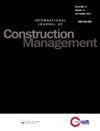Avoiding construction disputes: a comprehensive framework for pre-contract planning
IF 3.4
Q2 CONSTRUCTION & BUILDING TECHNOLOGY
International Journal of Construction Management
Pub Date : 2023-11-06
DOI:10.1080/15623599.2023.2276652
引用次数: 0
Abstract
AbstractMany industry disputes originate during the pre-contract stage, emphasizing the importance of preventing these issues early on rather than relying on post-facto resolutions. Therefore, professionals need to act proactively to avoid lapses in the pre-contract stage from the initial stage of the construction project. However, the current literature lacks an investigation of dispute avoidance by identifying professionals involved in the pre-contract phase of construction projects. This research, thus, aims to investigate the strategies to avoid disputes in construction projects in the pre-contract stage from the perspective of responsible professionals. The study adopted a qualitative approach by conducting semi-structured interviews among 15 industry practitioners involved in dispute management practices, selected through purposive sampling. The data collected was analyzed using the N-Vivo12. The findings revealed 48 lapses in the pre-contract stage and 104 strategies to avoid disputes. The findings further revealed that most of the lapses occurred during the technical stage. In contrast, the architects are responsible for design errors, and quantity surveyors contribute to documentation issues. The research offers a comprehensive framework for professionals and regulatory authorities to encourage dispute mitigation efforts, thereby contributing to the body of knowledge.Keywords: Dispute avoidancelapsespre-contractprofessionalsRIBA 2020strategies Disclosure statementNo potential conflict of interest was reported by the author(s).Data availability statementThe data that support the findings of this study are available from the corresponding author, [Liynawatta T.N.], upon reasonable request.避免施工纠纷:合同前规划的综合框架
摘要许多行业纠纷发生在合同前阶段,强调了早期预防这些问题的重要性,而不是依赖于事后解决。因此,专业人员需要从建设项目的初始阶段就主动采取行动,避免在合同前阶段出现失误。然而,目前的文献缺乏通过确定参与建设项目合同前阶段的专业人员来避免纠纷的调查。因此,本研究旨在从责任专业人员的角度,探讨在合同前阶段避免建筑项目纠纷的策略。本研究采用定性方法,通过有目的的抽样选择,对参与争议管理实践的15名行业从业者进行了半结构化访谈。使用N-Vivo12对收集的数据进行分析。调查结果揭示了合同前阶段的48个失误和104个避免纠纷的策略。调查结果进一步表明,大多数故障发生在技术阶段。相比之下,建筑师要对设计错误负责,而工料测量师要对文件问题负责。这项研究为专业人员和管理当局提供了一个全面的框架,以鼓励缓解争端的努力,从而促进知识体系。关键词:争议规避、合同前专业人员、riba 2020策略披露声明作者未报告潜在的利益冲突。数据可用性声明支持本研究结果的数据可根据合理要求从通讯作者[Liynawatta T.N.]处获得。
本文章由计算机程序翻译,如有差异,请以英文原文为准。
求助全文
约1分钟内获得全文
求助全文
来源期刊

International Journal of Construction Management
MANAGEMENT-
CiteScore
8.60
自引率
17.90%
发文量
112
期刊介绍:
The International Journal of Construction Management publishes quality papers aiming to advance the knowledge of construction management. The Journal is devoted to the publication of original research including, but not limited to the following: Sustainable Construction (Green building; Carbon emission; Waste management; Energy saving) Construction life cycle management Construction informatics (Building information modelling; Information communication technology; Virtual design and construction) Smart construction (Robotics; Artificial intelligence; 3D printing) Big data for construction Legal issues in construction Public policies for construction Building and Infrastructures Health, safety and well-being in construction Risk management in construction Disaster management and resilience Construction procurement Construction management education
 求助内容:
求助内容: 应助结果提醒方式:
应助结果提醒方式:


